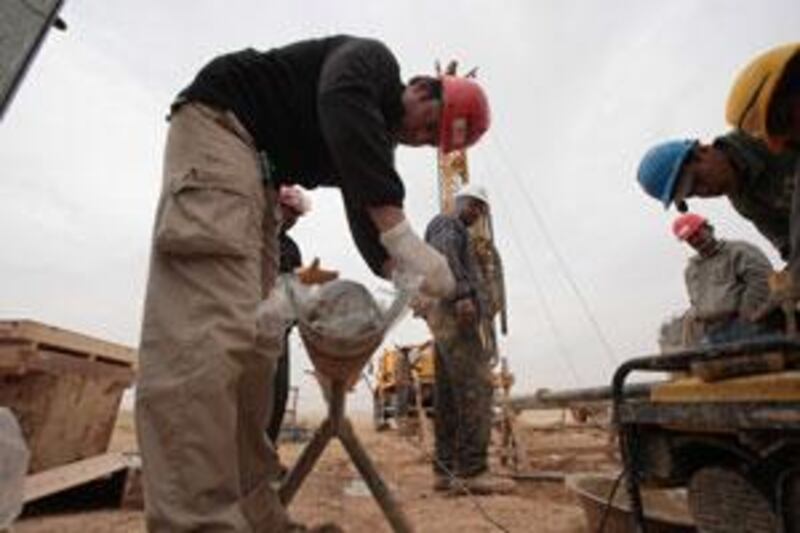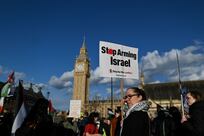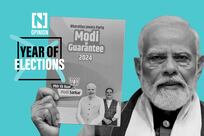In a region blessed with oil and gas, Jordan was dealt an unlucky hand. The country is among the most import dependent in the world, meeting 95 per cent of its energy supply needs from neighbouring states.
Now the government wants to leverage the one energy resource it does have in abundance - uranium - to start its own energy exports within a decade. With the help of an international partner, Jordan is hoping to become the second Arab state after the UAE to construct a civilian nuclear power plant, and wants to have four units operating in the country in 30 years' time. The dreams are big, but the challenges just as formidable, experts say.
The capital cost of nuclear plants, the particularities of regional politics and the capacity of the electricity grid could all prove to be major hurdles to overcome to implement a successful nuclear programme. Jordan is not in the same economic position as the UAE, and its leaders have said they will not give up the country's international right to enrich uranium, a decision that could make it harder for it to tap the technology and expertise of some industrialised countries.
Dr Khaled Toukan, the chairman of the Jordan Atomic Energy Commission, said last week he was aware of the significant challenges, but was confident they could each be overcome. "The conventional notion is of the Middle East as a rich, oil-producing region but on a country by country basis it is clear that many countries in the Middle East are suffering under the toll of high oil prices," he said, noting 20 per cent of the government's budget goes to importing fossil fuels.
"The development of secure alternative energy supplies is a top priority for the country and the decision makers in Jordan." The commission is now evaluating offers from a number of foreign companies to invest, build and operate a nuclear power plant in the country by the end of the decade, and plans to narrow the list of contenders to two by the middle of next month. The partner company will own as much as 40 per cent of the power plant, underscoring a significant departure from Abu Dhabi's approach, in which a consortium from South Korea was chosen as a contractor to build and then hand over four reactors, Dr Toukan said.
"In our case, we cannot actually have the same option," he said. "We have to look at the financing issue." The government likes to boast of its undeveloped uranium resources, which could one day offer a low-cost source of fuel for the reactors, but the price of the fuel forms a small proportion of the cost of nuclear power. The bulk of the multibillion-dollar cost comes at the beginning: for expensive technology; carefully regulated construction; and a plethora of costs associated with safety standards and international regulations.
Since the Jordanian government lacks the cash reserves and income to fully finance the project, it will depend on the equity partner to help pay for the plant up front and receive a return on the electricity over the plant's lifetime, which could range from 60 to 100 years. Both the partner and the government would be likely to take out large loans from banks and other financing institutions. Under such a model for any power station - known as an "independent power project" - the main concern of partner companies and any lending institutions is that they will be consistently paid for the electricity, said Michael Cooper, the director of infrastructure and export finance at HSBC Middle East.
"As a lender, we need to know that as we sign the agreement with the government utility, we're going to get paid for that power," he said at a nuclear conference in Amman. Given the high cost of the reactor, any country building one would require funding from all possible sources, including banks, export credit agencies and multilateral funding agencies, he said. "To build a nuclear power station, whether it be in North America, Europe or anywhere in the MENA region, you will need to use all the options," he said. "Not only are the institutions today providing less money on an individual basis, there are also less institutions to choose from."
To get financing from banks in the midst of the continuing credit crunch, nuclear developers needed to start talking to bankers years before a nuclear construction contract was awarded, he said. Bankers want to be assured that the particular safety and regulatory risks of nuclear power have been fully addressed by the country to the highest standards and accepted by the international community before it starts construction, Mr Cooper said. Jordan has already completed much of the preparatory work with its 2007 creation of an independent nuclear safety regulator and its ongoing feasibility studies for specific reactor designs and sites across the country.
The larger question, for bankers and multinational nuclear firms alike, is whether key foreign governments will sanction Jordan's nuclear aspirations by agreeing to share technology and expertise. The UAE's own programme gathered steam last year when the US government agreed to finalise a nuclear co-operation agreement. The so-called 123 Agreement was significant not just because it gave the UAE access to American technology and expertise, but also because it was understood by other foreign governments and multinational firms to be a vote of confidence in the Emirates's pledge to pursue nuclear energy safely and transparently.
Jordan has signed a memorandum of understanding with the US, and Dr Toukan predicted Jordan would be able to finalise its own 123 Agreement with Washington within two years. But a key provision of the UAE's agreement was that the country would give up its right under international law to enrich uranium, the process used for creating reactor fuel, but which can also produce the ingredients needed for nuclear weapons.
Jordan has rejected the UAE's approach, a move that will be likely to make it more difficult for it to get an agreement, said Antony Froggatt, a nuclear policy expert at Chatham House, the British think tank. "It would clearly be beneficial for them politically to take the same type of approach [as the UAE], but whether it would be a show-stopper, I don't know," he said. Inability to reach agreement with the US could make it more difficult for the Jordanians, since they would have less suppliers to choose from, he added.
"That may have a knock-on impact in terms of other countries being willing to supply, and on the final price as well." Jordan's nuclear aspirations also present a basic technical question that must be addressed before the reactors are completed: will there be a large enough market for the electricity? The short-term answer is "no", so the utility must have the option of selling power across the Middle East when Jordanian consumption dips.
A regional grid linking the Levant with North Africa and the Gulf is a prerequisite to the introduction of nuclear power in the region, said Abdelmajid Mahjoub, the secretary general of the Tunis-based Arab Atomic Energy Agency. "There are three grids, and at the moment there is not automatic interconnection," he said. "It's more technical, organisational and political" than a matter of investment. "The grid needs to be ready by 2015, two years before the UAE commissions its reactor."
All of the risks facing Jordan's nuclear programme are manageable, Dr Toukan said. The challenge is in convincing others to take the same view. cstanton@thenational.ae





